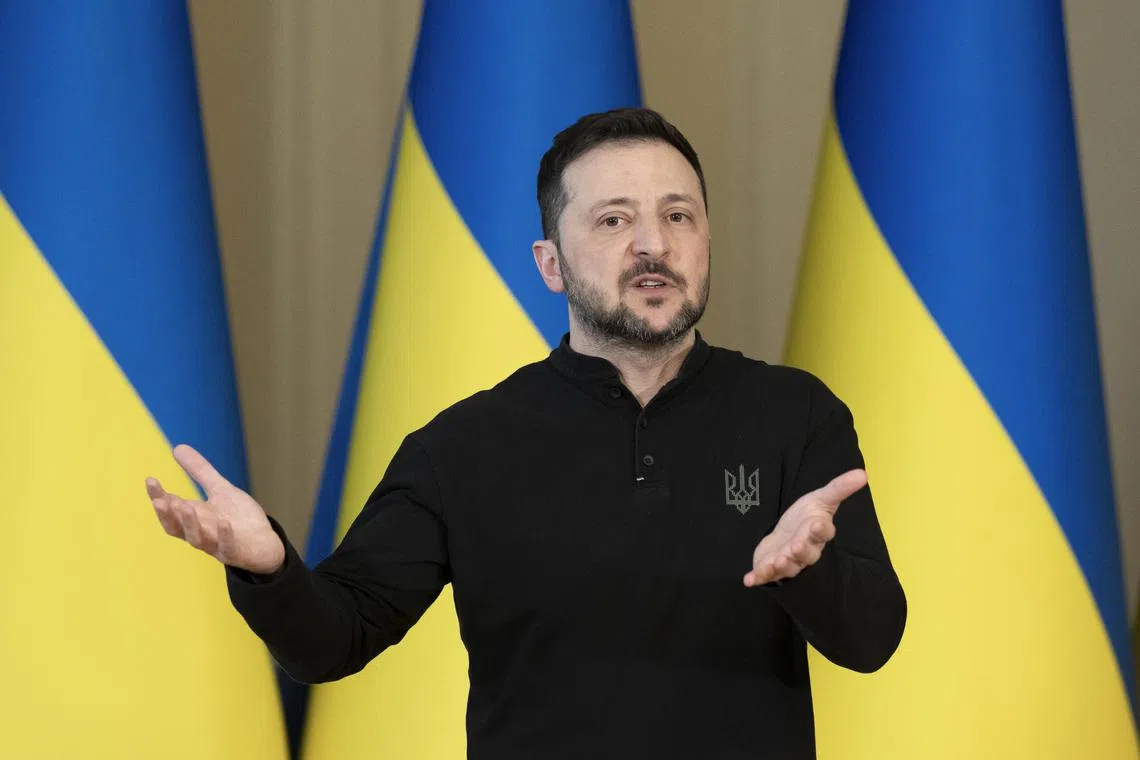Ukraine’s Zelensky expects ‘strong’ action from US if Russia refuses truce
Sign up now: Get ST's newsletters delivered to your inbox

Ukrainian President Volodymyr Zelensky said the US would pile pressure on Moscow if it did not accept a halt to fighting that claimed tens of thousands of lives.
PHOTO: EPA-EFE
KYIV – Ukrainian President Volodymyr Zelensky on March 12 said that the United States would issue a “strong” response to Russia if the Kremlin refused a 30-day ceasefire offer put forward by Washington and Kyiv.
The proposal to pause fighting between Russia and Ukraine after more than three years of brutal warfare came after intensive talks between Ukrainian and US officials in Saudi Arabia.
It also follows an explosive spat the truce plan
Mr Zelensky told reporters in Kyiv that the US would pile pressure on Moscow if it did not accept a halt to fighting that has claimed tens of thousands of lives.
“I understand that we can count on strong steps. I don’t know the details yet but we are talking about sanctions and strengthening Ukraine,” Mr Zelensky told reporters including AFP journalists.
“Everything depends on whether Russia wants a ceasefire and silence, or it wants to continue killing people,” the Ukrainian leader added.
The truce offer comes at a difficult moment on the battlefield for Ukraine which is losing ground in the east and south of the country where officials said eight people were killed
Muted Kremlin response
And even if Russia agrees to a ceasefire, much remains uncertain in negotiations. Ukraine has pressed for security guarantees, but Mr Trump has ruled out Nato membership.
The Kremlin in its first comments on the proposition said that it was waiting for details from Washington.
Earlier in March, however, its foreign ministry had said that a temporary ceasefire was “unacceptable”.
Kremlin spokesman Dmitry Peskov said that Moscow did not rule out a “high-level” phone call with the US about Ukraine.
“We assume that Secretary of State (Marco) Rubio and adviser (Michael) Waltz through various channels in the coming days will inform us on the negotiations that took place and the understandings reached,” Mr Peskov said.
Earlier, Russian news agencies reported that US and Russian intelligence chiefs had held their first phone call in several years.
The CIA’s Mr John Ratcliffe and Mr Sergei Naryshkin of Russia’s SVR foreign intelligence service agreed on “regular contact” between their agencies “to contribute to the international stability and security, as well as a decrease in confrontation in relations between Moscow and Washington”, the Tass news agency reported.
There is little hope in Ukraine, however, that even if the Kremlin agrees to a truce that its forces would actually halt fighting.
Peace only ‘when Putin dies’
“I have emphasised this many times, none of us trust the Russians,” Mr Zelensky said.
In the front-line Ukrainian city of Kramatorsk, a 44-year-old Ukrainian serviceman said Russia could only be forced into peace.
“They’ll say in public that there’s no fighting and no shelling, but this scum has always harassed us and it will continue to,” he told AFP.
Mr Roman Dunayevsky, 56, said Russia likely would not stick to its agreements and that there was only one way to ensure peace.
“Peace will come when (Russian President Vladimir Putin) dies. That’s the only way. When the dictator is gone,” he told AFP in the Ukrainian capital.
In Washington, Mr Trump said that he was ready to welcome Mr Zelensky back to the White House and may speak to Mr Putin this week.
Asked by a reporter about the prospects of a comprehensive ceasefire in Ukraine, Mr Trump answered: “Well, I hope it will be over (in) the next few days.”
Russia, despite already holding several rounds of talks with US officials, has stepped up attacks on Ukraine’s energy infrastructure and seized back land in its Kursk region that Ukrainian forces had infiltrated.
Mr Zelensky told reporters in Kyiv that Russia was intensifying attacks in the Kursk region, where Ukrainian troops have been losing ground since launching their audacious cross-border offensive there in August 2024.
‘Maximum pressure’
“The Russians are clearly trying to put maximum pressure on our troops, and our military command is doing what it has to do,” Mr Zelensky said.
The Russian military just several hours earlier announced more sweeping gains in Kursk, taking back control of five villages and entering Sudzha, the largest town that fell under Kyiv’s control.
Mr Trump’s abrupt shift on Ukraine following former US president Biden’s strong support has rattled European allies, with France and Germany increasingly speaking of developing common European defence if the US no longer offers its security guarantees through Nato.
German Chancellor Olaf Scholz on March 12 said that any ceasefire must be part of a process that leads to a “lasting agreement”.
“Some things are very important and central – a ceasefire must be embedded in a peace process that leads to a lasting agreement,” Mr Scholz told reporters in Berlin alongside European Union Council chief Antonio Costa. AFP


